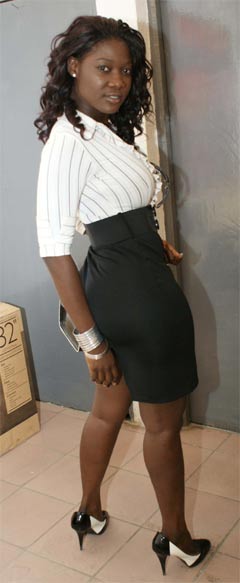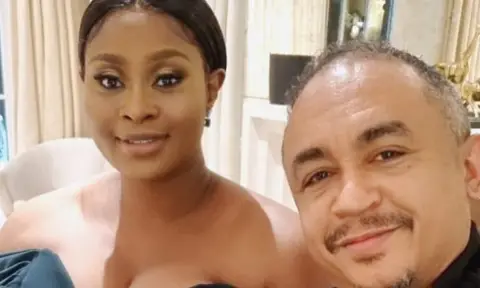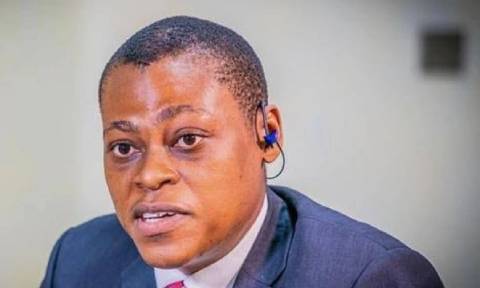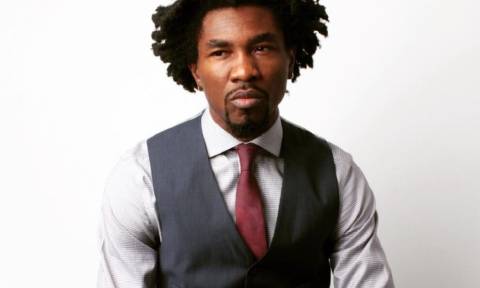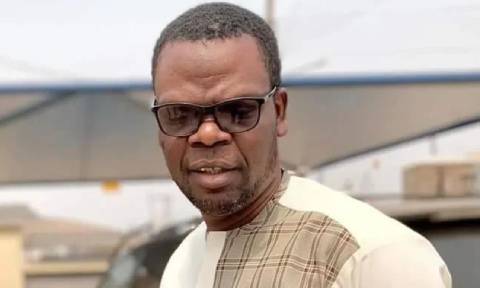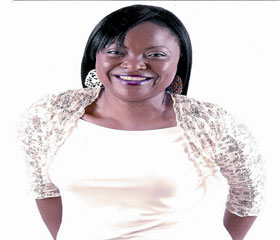
Aisha Falode is an icon in female sports journalism in Nigeria. A native of Ibadan in Oyo State, Aisha ventured into broadcasting in 1996 and landed on a desk that is always dominated by men –
Sports. Although her first degree was in physical education and she has a post graduate degree in Mass Communication, but she describes her journey into broadcasting as God-ordained. In this interview with RONKE KEHINDE and ODUNAYO OREYENI, Aisha talks of her humble background and how she almost missed education because her parents could not afford to send her to school; how she became a trader at the gutter, Isale Eko market, and her success story.
When did you get involved in reporting sporting activities?
It was in 1996 when Chief Raymond Dokpesi was planning to break new grounds in Television Broadcasting, 24 hours broadcasting in Television, after he had successfully pioneered 24 hours broadcasting in radio. He thought that Television should not be limited to certain times in Nigeria, more especially when the world was beginning to think big in Technology and you cannot begin to spread Technology without spreading the information about it and he thought the way Television Broadcasting was being practised then by the National Television Authority was no longer the trend. So when he started looking for people, for his 24-hour Television Station, which is today known as African Independent Television (AIT), I approached him. Even though I didn’t have any experience in broadcasting, I was trained as a Sports woman. I was very active in my younger years. I had my first degree in Physical Education. I had my post graduate in Mass Communication and I thought this is something I have a passion for. I would really want to get involved in reporting sports on Television. So I applied and I went through the interview and the written examinations. AIT was going to start in December, but I was employed sometime in May. I started full work with Ray Power and it was on the 3rd of June 1996, just so, I could begin to learn the ropes from radio on the Sports Desk. By the time AIT started in December, I just transited from Radio to Television and that’s how I got involved in Television Sports reporting and casting. It was my very first experience.
What were you doing before you became a Sports reporter?
I worked briefly with NITEL (Nigerian Telecommunication Limited), again with the Graduate Telephone Operators Scheme of the then NITEL. International Telephone Operators were also looking at changing the concept of telephone operations. Before us, the people they had employed as Telephone Operators were either Primary School Certificate Holders or Secondary School Certificate Holders and since NITEL was the only Telecommunications outfit in Nigeria then and a lot of people were also making International calls, they needed people who had the educational qualification to be courteous on the phone to their customers, to also be fluent in spoken English and also be very disciplined. So we were used as Guinea pigs for that scheme. We went through the training at the NITEL training school in Oshodi for three months to become graduate Telephone Operators and I was in Number 23 Saka Tinubu Exchange of NITEL then. I worked there for one year, but then it became kind of stressful for me because I was working and at the same time doing my Masters Degree programme in UNILAG and then of course, I was also pregnant with my daughter. So it became a bit stressful for me, so I had to pull out of NITEL to complete my Education and also have my baby. After I left NITEL, I also dabbled into some buying and selling for a while. I had a shop on Adeniran Ogunsanya, where I was selling shoes, bags and lace materials, and from there my aunt thought that the market for lace was in Isale Eko. So, she moved me down to Isale Eko, what is known as Gutter, but I couldn’t fit in into Gutter. I think after a year, I just abandoned the thing and said this is not me. Which was why, when the idea of Television came, I knew that was where my heart was. This is something I had a passion for and I want to do and I’m glad that I took the decision right there.
People talk about dreams, dreams are not passion. As a child you dream to become a lot of things. Dreams are not factual, they are not reality, and they are fantasies. You fantasize as a child to become the best in life. Sometimes as a child, you think that when you grow up you will live in two houses at the same time, your house will be very big, you will ride the best of cars, but as you grow old your perception begins to change and you’ll begin to be real. As a child I used to think that I would become a Lawyer; sometimes, at a certain point it was Nursing that was in vogue when we were growing up. You want to become a Nurse as you grow older. Your dreams keep changing. But when you begin to reach your adulthood, you discover that dreams are not real, unless something miraculous happened that is when you chase your dream and live your dream. For me, I had a lot of dreams like I said. But as I grew older I thought that what I have a passion for, turned out to be different from what my dream was. My passion was to do what I’m doing now; to be on Television, to report sport, to be daring, to be different, and this is what it was about when I started sport broadcasting. I can’t even remember if there was a woman doing it then. But I started and a lot of people were sceptical about a woman being in a man’s world; maybe she’s just a flash in the pan; let’s see how long she will last in this. But, that was the strength because people didn’t believe in what I was doing. I also saw that as a challenge and I needed to prove them wrong. I thank God I had the support of the Chairman of Daar Communications who in spite of the fact that I was a green horn, gave me the chance and he was also very encouraging in giving me the opportunities. At a time, I even thought I was being pushed too hard, but I’m also very tough. My personality can be very deceptive, as shy, and simple; you could crack her easily. But then, when they tried, the reaction shocked most people and they began to look at me differently. They say: “We didn’t see you as this person that you are presenting.” Which I see as strength, when people doubt your ability or strength, when they doubt how hard you can push yourself, it gives you head start, by the time they would realise that their perception of you is different, you are almost at the finishing line and they are the ones doing catch up. That is what has happened.
What was on your mind when you enrolled for Physical Education in Higher Institution?
I was Tom boyish growing up. I was very athletic while I was growing up. I keep telling people I represented Lagos State at two National Sports Festivals, Kaduna 1977, and Oluyole 1979. I was very athletic in school. In fact most of my teachers when they see me today, they say, “Look we were wrong about you”, because people who were involved in sports would either end up as drop out or something that is very negative. In our days in school, we were always travelling for sport assignment either with the Lagos State or with the school itself. When we were in school, school sport was very vibrant, it was very competitive; school sport was alive in our days in school such that we look forward to school sport. I was very involved in school sport; I played handball and hockey. I also did a little bit of athletics such that when I was not representing the school, I was representing the state. So there was little time for study; but in between that little time, we were also disciplined to know that education is the key. Education is important. So we were able to combine those, but sometimes we would lag behind in submitting our homework, we would miss some lessons. But the teachers too were also committed; they would always cover up what you have lost in terms of giving you extra lessons. So, I knew from the start that if I didn’t end up as a professional athlete, I was going to be doing something close. So as close to be on the field one way or another and this is what is happening today.
Tell us about your family and educational background?
I come from a humble family background, a humble background means not affluent. But as humble as we were, we were able to afford the basic things in life, not too much but things to get us by. I come from a very large polygamous home. I was born in Ibadan, grew up partly in Ibadan, but my parents home was in Ibadan. I didn’t gets to live with my parents while I was growing up; I was living with one family member or another. At the age of eight or nine years, while I was in primary two, I was sent off to the village very close to Auchi Polytechnic in Edo State. I was sent off to live with my elder sister who was married and then living in the village. But my maternal grandmother didn’t like the way she was bringing me up, so she took me from her, still within the village. When she died, I was sent off to my aunt, my mother’s sister, the only surviving siblings, until the time I finished my primary school, and then re-united with my parents in Ibadan for one year after which they couldn’t quite decide on what they wanted to do with me. My father obviously didn’t have enough money to send me to secondary school; my mother wanted me to continue with my school; but in between that decision, they sent me to typing school and I did that for one year attending a typing school. Then Obasanjo came up with the universal primary education; free education for everybody, especially for teachers so they saw that as an opportunity for me to still continue with my education. So I was sent to Lagos to live with my eldest brother. I joined again the pioneering programme of the UPE, (Universal Primary Education), free education for everyone in Teachers Training College for five years at the Muslim Teachers Training College at Randle Avenue, in Surulere, Lagos. But I’m told that that school has been moved to somewhere in Agege or it’s no longer in existence. But I have good memories of Muslim Teachers Training College. We had the best of every thing, free. When I see what’s happening with the education sector today, I begin to wonder at those who are from a humble background as I come from, if they still have a future at all in this country. Because if they are not given the kind of opportunity I was given, if perhaps I didn’t have that free primary education by the General Obasanjo then; perhaps I would have ended up an illiterate; and my offspring will be illiterates as well, and then the chain goes on. But because of that opportunity, see how that generation has been changed. I had the opportunity to go to school, even though my parents knew that education is important. Even though my mother was a petty trader in Mokola Market; my dad was a driver with Unilever and between the two wives they had 19 children. My mother had 10 of those 19, and even with their background they still could recognise that education was important, that they needed to give their children education. My elder siblings went up to university, some of them enjoyed the benefits of scholarship, perhaps without that kind of structure maybe they would not have been able to send them to school. So, what I’m trying to say here is that, we need to re-evaluate our values in this country. We need to begin to look at caring for the under-privileged, because if majority is illiterate, then the country does not have a future. So, may be during the next election, the parties should make primary education, not only a campaign point, they must enforce free education to perhaps tertiary level, so that everybody is given equal opportunity to survive in this country. So I’m very grateful for the upbringing I had and for the system that was in place in Nigeria then and I think we must bring back that system to give opportunities to every Nigerian to survive.
What are the schools you attended?
I went to ICC, Mokola, Ibadan, that’s where I started my primary school; I left at Primary Two and then went to the village to finish my primary school at Early School in Ibie-Iyakpi in the Etsako West Local Government Area of Edo State. I came to Lagos, to Muslim Teachers Training College; then I went to the University of Lagos to do my first Degree in Physical Education, and then had a post graduate diploma in Mass Communication from the University of Lagos.
Share with us the memorable days you had in the cause of your duty.
There are so many of them. You cannot point a finger at a particular one. But the most memorable for me definitely would be in 2002, in Korea /Japan FIFA world cup. I covered that for AIT. That was when I knew that football is very big. I don’t want to put football on the same level as religion, but the power of football is unimaginable, the power of unity, the power of hope, the joy it brings to people, how football can be used to heal conflict, how it can be used to fight wars, how it can be used to bring hope to people; people who are downtrodden or how it can give you joy in moment of sadness, joy in moment of disintegration. I saw that in Korea/ Japan. Even though we speak different languages, the language of football is understood by everybody. I saw that in Korea/ Japan. That was the world cup where Africa was on the world stage, when Senegal in that opening game against defending champion France, beat the defending champions and we were almost going to qualify for the semi-final of the world cup against Turkey before they were knocked out. It was so euphoric for me. I remember having to go and see the team, after we were knocked out in the first round and a lot of the other African countries had also gone home, the other two had also gone home. So Senegal was Africa and it was a story we were all pursuing, more from the international Medias than from Africa and I had the opportunity. I got to their hotel that day, very vivid in my mind. There was this whole world media camped in front of the hotel of ‘The Lions of Senegal’ and they were being closely guarded from the media. I had spoken with one of the members of the team using my connections from the continent, and the boys, the way they welcomed me it was very emotional for me. Even, when talking about it now with some of the boys coming from their rooms to escort me from the lobby where the CNN, and BBC, Euro Sport guys, and all of them were gathered, it’s something great. They took me to their room upstairs and they were all in the room and we were talking about Africa, talking about football, talking about the joy they had brought to the continent and also talking about how we can use football to heal a lot of wounds on our continent and how the Administrators of the game on the continent can use the power of football to do a lot of good like education. When I finished with them, and I was about going, I was very proud of myself and I was very proud of those boys that indeed in the midst of all these they were not carried away with the success they had achieved. When it was time for them; their success on a larger scale, they thought about the continent first. For them to get me out of that place to give me what everybody else was seeking, that to me was very fulfilling.
What is the most memorable day of your life?
The day I gave birth to my daughter was memorable. When I was pregnant, I was still working at NITEL. It didn’t get to show that I was pregnant until very late. I will tell my colleagues in the morning that I was going for ante-natal, they would be laughing at me, saying, “Look at you, you think pregnancy is so cheap”, just because they didn’t see my big tummy and I was still as active as ever. But I was six months pregnant. When they heard that I put to bed, they were shocked.
My daughter was 3.75kg. Professor Tiaminu Osagie was my gynaecologist. I gave birth on Wednesday 7:45am in January 15, 1992. It was so vivid in my memory that I felt that now I am responsible for another life. I was determined that I will do all it takes to bring this one up well. I have two kids now, male and female.
Being a woman in a man’s world, what are the challenges involved?
There are no more challenges in breaking barriers any more in a profession. If anyone tells you that this is a man’s work, that’s just a ploy to break you, it’s a ploy to demoralise you, it’s to kill your potentials. Because as it is now, the women have proven to men that given the same opportunity, we can be very productive, we can summon challenges, we can be innovative and we can deliver. That to me is outstanding because we have seen women in this country doing well in the political, in the corporate world, even on their own. They have succeeded beyond the imagination of everybody. That is the spirit of a woman, that’s the character of a woman, that’s the strength of a woman. So I don’t think anybody still talks about some jobs being stressful. When I started some people said maybe she was a flash, they thought this will soon fizzle out. But by the time they realized I was in the game also, I was almost at the finishing line. I also do say this that by the time they realize that you know what you are doing; you will get the same equal respect they were sceptical of when you started.
What is the biggest sacrifice for you in your career?
The biggest one would definitely have to be my daughter, when she was going to write her examination to enter secondary school. I wasn’t there because I was away in the United States during the Women’s World Cup. That was the biggest sacrifice; my heart was there that my daughter is writing the most significant step of her life today.
What would you consider the boldest step you’ve taken so far?
The boldest step was breaking away from the ‘Gutter stuff’ and breaking from buying and selling and realising that this is not me. I’m not supposed to be here. Some people would have that feeling, they will see it, it’s obvious and yet they’ll still want to push themselves. Perhaps, I can adjust that step I took that, this is not my circle, I need to get out of this thing now, and I took that step. Just as I was stepping out of that, I saw what was my vision and passion and I stepped into it.
Are you hoping to take after your mother, by having many children?
No way! I don’t think anybody is doing that in this world any more. Even the women who are not literate have been taught family planning. They don’t even have to teach you family planning for you to know how to plan your family. In today’s Nigeria, you have to bring up kids well. We are not saying you should give them the best, but at least give them what is human, education is the key, education is important. You cannot compromise education and I think government has to make education free to tertiary level, especially for those who cannot afford to send their children to school.
What would you consider as your greatest achievement so far?
I wouldn’t say I have achieved my greatest. You never achieved your greatest, though you still set boundaries; you set goals, as you achieved one, you set higher ones. So I will say for me, I have not achieved my greatest goal yet.
How do you unwind?
I unwind by staying at home watching television and spending time with my family.
What is your phobia?
I do not know if there is life after death. I think for a lot of us, it is not the fear of dying. It is the fact that you don’t know what is after death that is a phobia for me such that I want to live forever because I don’t know what is going to happen after death. That is a phobia and it is real.
What is your advice to young ladies who want to follow your footsteps?
It is very difficult to give advice because you can give advice and your advice is not followed. But I think a lot of young ladies today are much more driven than we were, they chase after their dreams, their goals and they are much more focused; they are hungrier than we were for success and achievement. But there is no short cut to all of these; they really must work hard for it. If you are going to look for short cut for it, you will just be a mirage because it will backfire. You have to work hard at it and you have to earn it meritoriously and be focused on your dreams.
How have you been able to cope as a mother and a sports editor?
It is difficult to say how I’ve been able to cope. It is taking one day at a time. These days when the world is now a global village, you have the internet, you have the telephones, and you have e-mail such that you are never away from home whenever you are away because technology has made it so.
